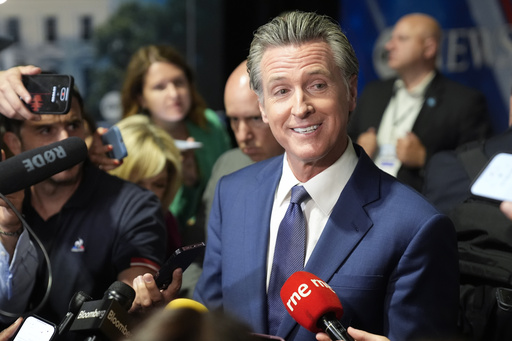
Democratic leaders in various states, including governors and attorneys general, are re-examining their strategies for responding to policies that may be implemented by President Trump in his anticipated second term. They are aware that resisting his administration could prove to be more challenging than during his first time in office. Trump’s campaign priorities feature mass deportations of undocumented individuals, a history of rolling back environmental protections, and nominating justices to the Supreme Court who have played a role in overturning key rulings like Roe v. Wade. These considerations are prompting liberals to unite and strategize an organized resistance.
In light of this, governors like Gavin Newsom of California are already taking proactive steps. Newsom has called for a special session of the legislature to begin formulating laws aimed at making the state’s policies resilient against potential federal intrusions. Concurrently, the governors of Colorado and Illinois are spearheading a nationwide initiative named “Governors Safeguarding Democracy,” which aims to protect democratic principles in light of anticipated federal changes.
Reflecting on past interactions between state governments and federal policies, an examination reveals that states have successfully challenged several of Trump’s directives. Over the last two decades, the role of state attorneys general has become crucial in countering presidential policies from opposing parties. Trump’s first term saw an unprecedented 160 multistate legal actions taken by state officials against his administration, a number that far exceeds the actions taken against President Obama. During this time, various state officials came together to thwart certain policies—some actions yielded temporary victories, while others, such as immigration bans, were more complex and ultimately reversed by higher courts.
Governors and state legislators also played significant roles in implementing laws to resist Trump’s initiatives. For example, California and other states passed legislation to limit local cooperation with federal immigration authorities during Trump’s presidency. However, it is anticipated that Trump may seek assistance from GOP leaders to execute his policies this time around. He could prompt governors to mobilize National Guards as a part of aggressive deportation efforts from day one of his presidency.
In terms of the legal environment, there are notable changes that Democrats must navigate. Bob Ferguson, Washington’s governor-elect, noted in a recent conference that Democratic attorneys general have coordinated their strategies to defend against potential policies from Trump’s second term. He acknowledged that early legal challenges to Trump’s initial actions were often effective due to hasty rollouts by the administration. This time, however, he predicts a more structured approach from Trump’s team, posing unique challenges for state officials.
The current judicial landscape is also markedly different, shifting to a more conservative tilt largely due to Trump’s judicial appointments. With 245 judicial appointments, including three Supreme Court justices, the courts may not be as favorable towards Democratic challenges as they once were.
The battles will extend beyond courtrooms, as Democratic attorneys general are expected to engage continually with federal policies from inception to implementation. They will likely challenge proposed regulations and take legal action if necessary. Actions targeting executive orders, particularly regarding immigration, could be fruitful given their vulnerability to legal scrutiny.
Moreover, state officials can exert influence through litigation that can lead to settlements with corporations—an avenue that has been successfully employed in regulating the pharmaceutical industry without necessitating explicit federal legislation. While states are barred from forging treaties, they can participate in international agreements concerning climate change and enhance local enforcement of environmental regulations should federal oversight diminish.
Importantly, the political landscape is also a motivating factor for Democratic leaders in this renewed resistance. Figures such as California Attorney General Rob Bonta are expected to lead the charge, positioning themselves for future opportunities. Additionally, prominent attorneys general, such as Letitia James from New York and Josh Kaul from Wisconsin, have expressed their commitment to counter Trump’s policies. The recent announcement by governors Pritzker of Illinois and Polis of Colorado about the establishment of Governors Safeguarding Democracy underscores a collective effort to uphold the rule of law, framing the initiative as essential to protecting democracy itself.
As these efforts unfold, Democrats aim not only to safeguard state interests but also to shape the political discourse surrounding Trump’s policies as they prepare themselves for the challenges ahead.
